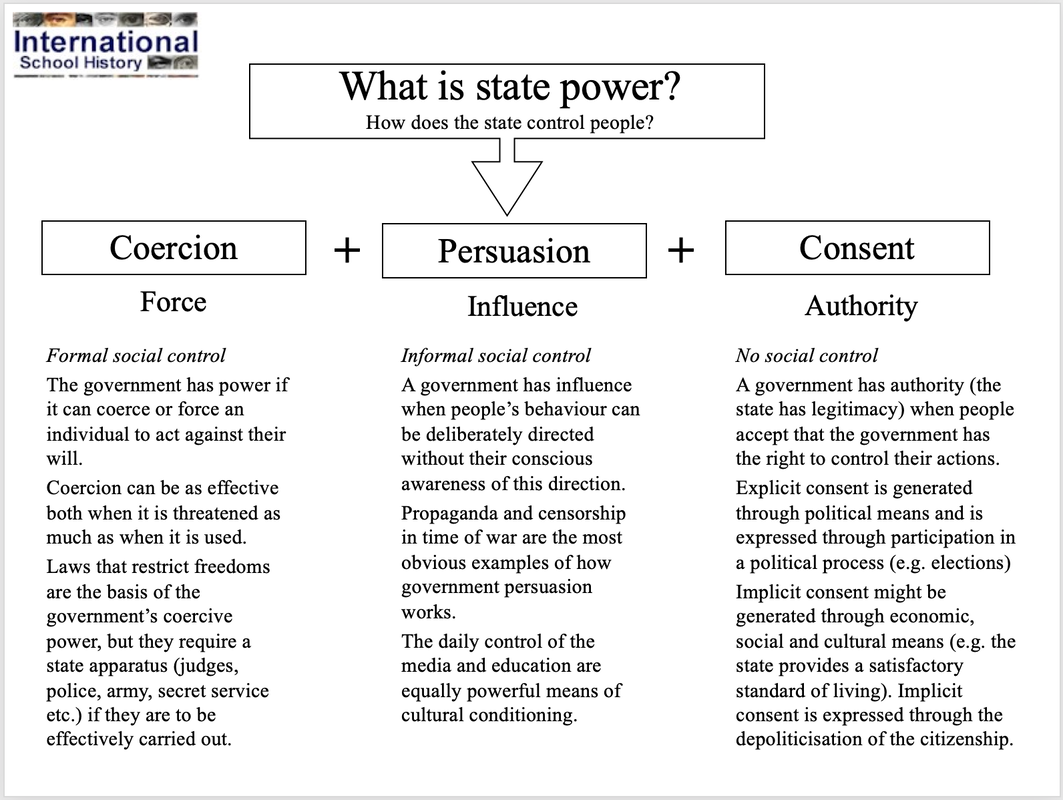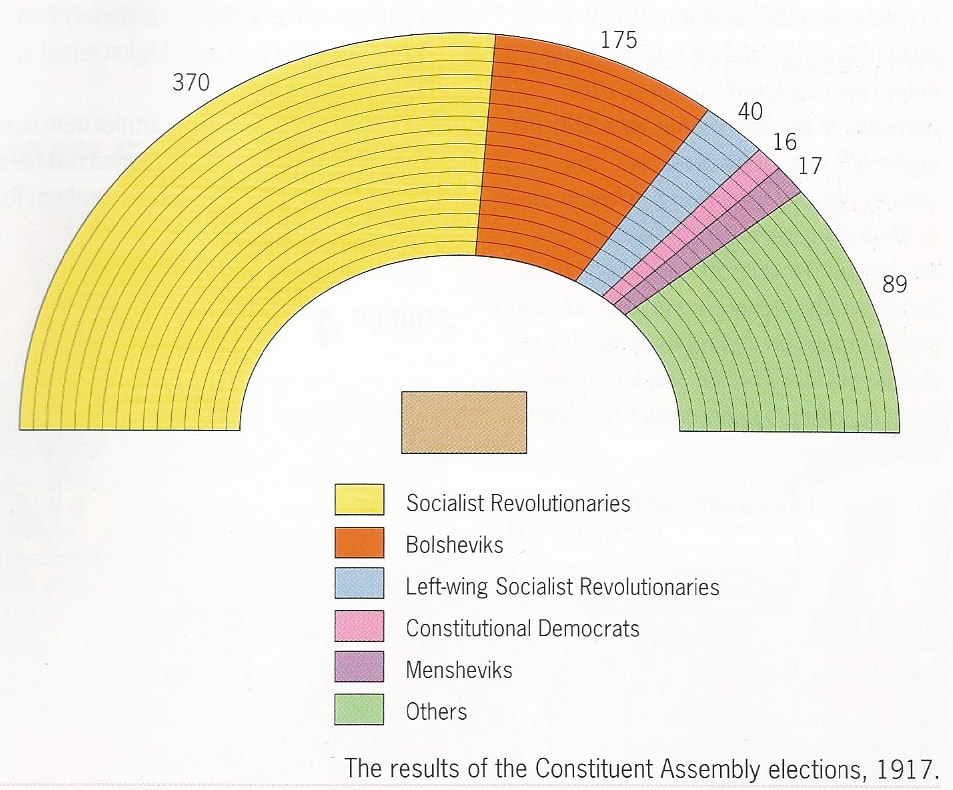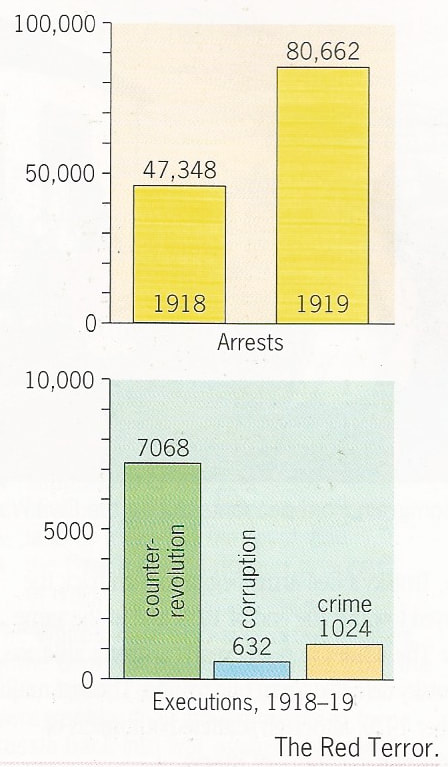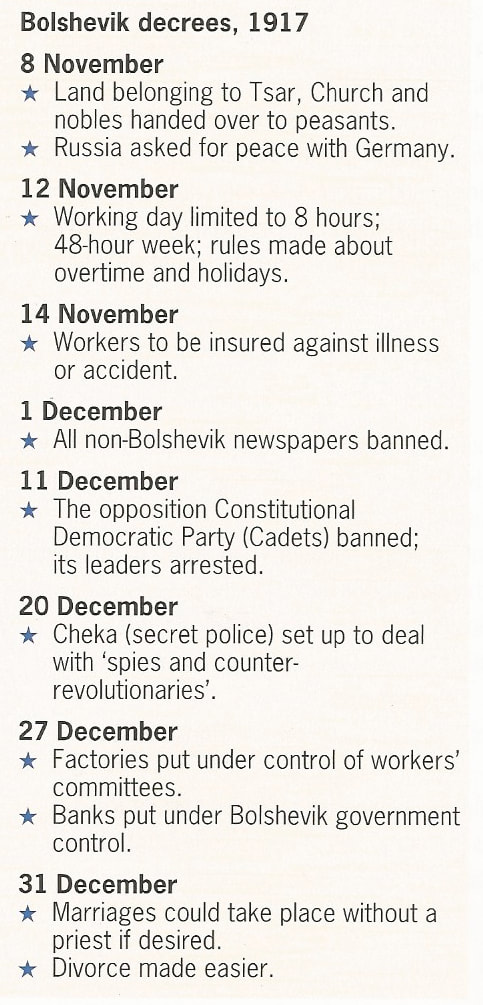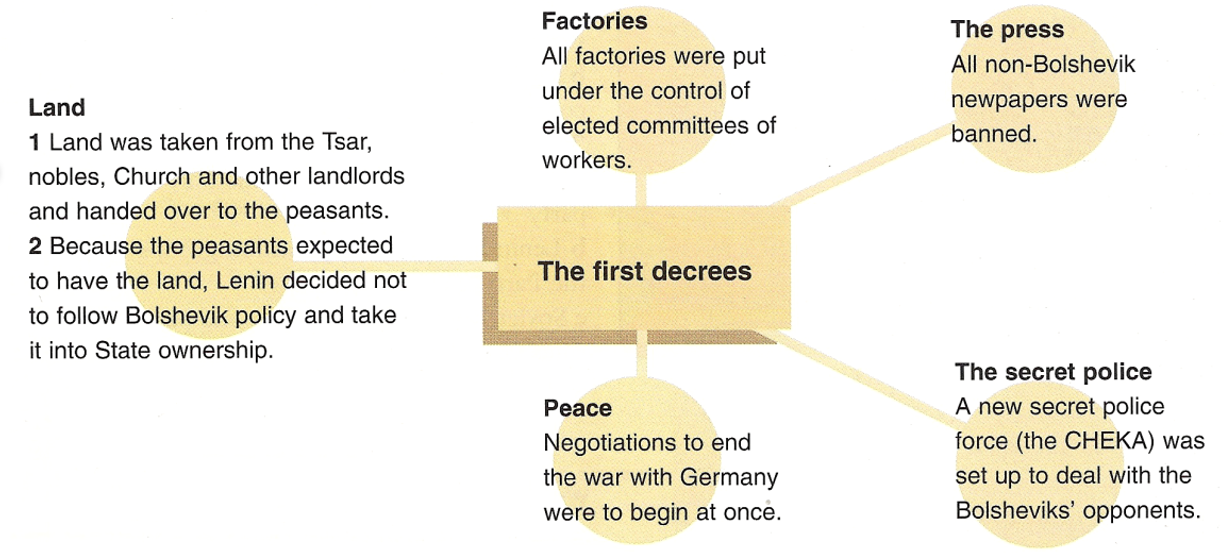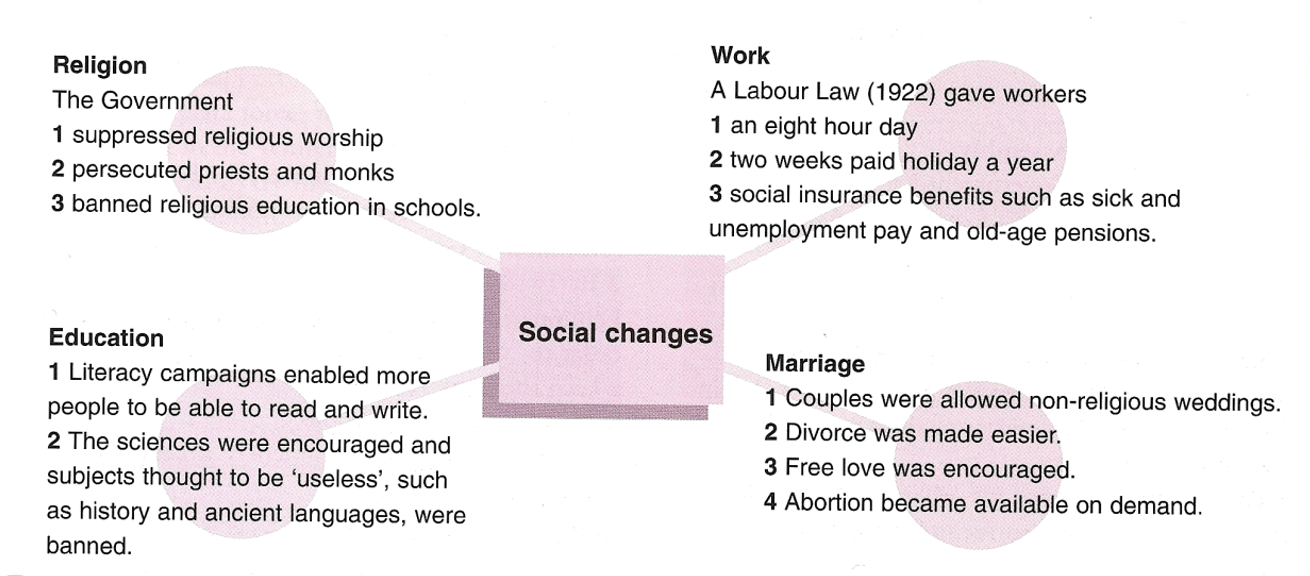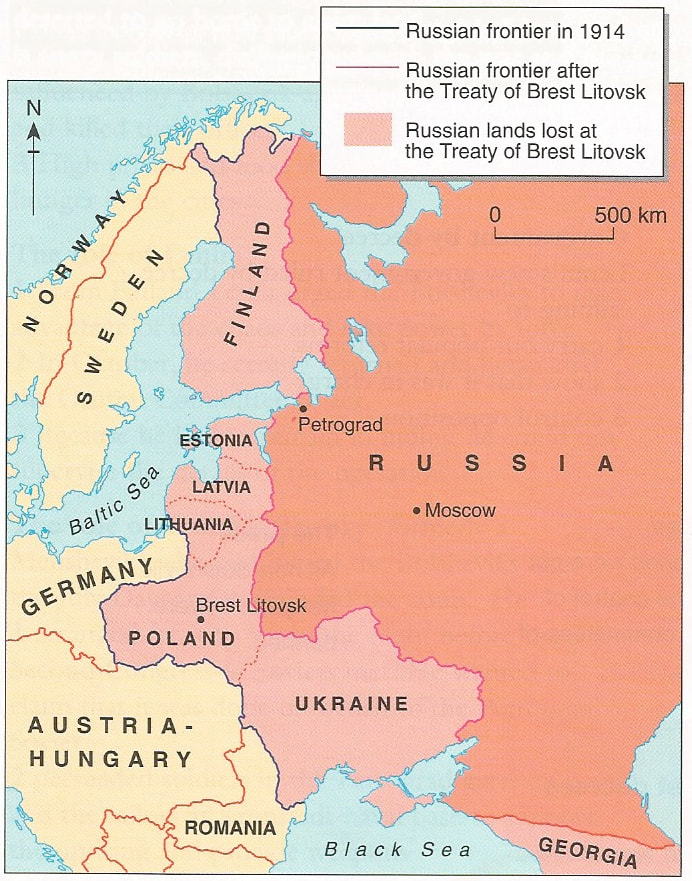Lesson 7 - The Bolsheviks consolidate their power - 1917-18
|
We began this unit by making comparisons between the situation in Russia before the First World War and France before 1789. The next two lessons take the comparison a step further.
Was Lenin a Russian Robespierre? Did wars enable terror? Was Trotsky another Bonaparte in waiting? But in addition to looking back, we will also be looking forward. What happens in Russia after October 1917 has global significance and very long-term consequences. The Communist regime established by Lenin in October 1917 would very quickly become the world’s first modern authoritarian state, Mussolini’s Italy and Hitler’s Germany were soon to follow. |
|
The communist ideology that Lenin helped create, would after the Second World War provide an alternative model of social-economic and political organisation that would challenge the hegemony of American led liberal capitalism and provide the basis of the Cold War and much inspiration for decolonisation.
We are to begin with a little theory. We need to understand the nature of state power. How does any state manage to control its citizens? Why do individuals agree to be governed and do as they are told? Once we understand how all states operate, then we can consider what happened in Lenin’s Russia.
We are to begin with a little theory. We need to understand the nature of state power. How does any state manage to control its citizens? Why do individuals agree to be governed and do as they are told? Once we understand how all states operate, then we can consider what happened in Lenin’s Russia.
Coercion, persuasion and consent: How did the Bolsheviks hold on to power?
|
|
The planned revolution is enacted and Bolsheviks seize power, but what happens next?
The first thing the Bolsheviks did was organise the democratic elections for the Constituent Assembly that the Provisional Government had avoided. When the results of the Constituent Assembly elections were announced, the failure of the Bolsheviks to achieve a majority (See below) meant that Lenin either had to resign or find another way to govern which did not depend on the legitimacy of popular election and the consent of the governed. |
|
The Constituent Assembly met for the first time in January 1918, but its work was short-lived.
Just a few hours after the Assembly convened, Bolshevik forces stormed the building and forcibly dissolved the body, marking the end of Russia's first short-lived experiment with parliamentary democracy. The next democratic experiment would have to wait until after the collapse of communism in 1991... Spolier alert, it didn't last much longer. |
The use of coercive force was to play an important role in controlling political dissent. The Cheka secret police was set up in December 1917 and number of arrests almost doubled in the following 12 months. In the same period, more than one in six executions carried out were for 'political crimes'. (See data above)
|
Informal social control, such as propaganda, was also very important in helping to generate support for the regime. The Bolsheviks used a range of innovative techniques coordinated by the Department for Agitation and Propaganda (Agitprop) under the leadership of Evgeny Preobrazhensky. Agitprop sought to explain the policies of the Communist Party and to persuade Russians to support and join the party.
The party newspaper Pravda was central to the dissemination of agitprop but the Bolsheviks also pioneered using modern transportation to reach deeper into Russia. Agitprop trains released propaganda leaflets from the window and carried motorcycles and cars in order for propaganda materials to reach the villages not located near railway lines. They also carried sympathetic writers, artists and performers (see the film opposite) and were equipped with a printing press to be able to adapt propaganda to local issues. Trains even took cinema projectors into villages where peasants had never even seen electricity before. As Lenin said, ‘Film for us is the most important of the arts’. Teachers were trained in 1919, and sent to the countryside to train other teachers and to expand the operation into a network of literacy centres. New textbooks were created, explaining Bolshevik ideology to the newly literate members of Russian society, and the literacy training in the army was expanded. |
|
In addition to the use of coercive force and persuasive social control, it also important to recognise that many Bolshevik policies were very popular with large sectors of Russian society who consented to Bolshevik rule.
Although punitive, the treaty of Brest-Litovsk on March 3 1918 brought the long promised peace so important to the soldiers who had backed the Bolsheviks. (This topic is very popular with one of the Matu examiners so make a note and remember this). The Treaty of Brest-Litovsk was a peace agreement between the new Soviet government of Russia (led by Vladimir Lenin) and the Central Powers of World War I (Germany, Austria-Hungary, Bulgaria, and the Ottoman Empire). The treaty ended Russia's participation in the war and ceded large amounts of territory to the Central Powers. Under the terms of the treaty, Russia lost control of a significant portion of its territory, including Finland, Poland, Ukraine, Belarus, and the Baltic states. (see map above)
One of Lenin's earliest decrees in November 1917 redistributed the church and aristocratic lands to the peasantry and in December factories were formally put under the control of the Soviets. There was a whole series of remarkably progressive social and cultural measures that were decades ahead of their time, women in particular enjoyed a range of rights and freedoms that were still unknown in the west. Finally - something that was to become increasingly important - Bolshevik party members found plenty of employment opportunities that grew dramatically as the communist state and the 'dictatorship of the proletariat' expanded its control over Russian society and its economy. This 'nomenklatura', a Bolshevik bureaucracy drawn from the ideologically pure working class and peasantry, owed their newfound position of influence to the party apparatus. They therefore had a clear vested interest in defending the regime. Thus as the historian Acton concluded, the basis of Bolshevik authority 'rested no longer on mass support but on a combination of force and patronage'. The chairman of the communist bureaucracy, initially a minor role within the party hierarchy, would as a consequence become increasingly important as the power of their patronage expanded. In 1922 the party chairman was Stalin.
Although punitive, the treaty of Brest-Litovsk on March 3 1918 brought the long promised peace so important to the soldiers who had backed the Bolsheviks. (This topic is very popular with one of the Matu examiners so make a note and remember this). The Treaty of Brest-Litovsk was a peace agreement between the new Soviet government of Russia (led by Vladimir Lenin) and the Central Powers of World War I (Germany, Austria-Hungary, Bulgaria, and the Ottoman Empire). The treaty ended Russia's participation in the war and ceded large amounts of territory to the Central Powers. Under the terms of the treaty, Russia lost control of a significant portion of its territory, including Finland, Poland, Ukraine, Belarus, and the Baltic states. (see map above)
One of Lenin's earliest decrees in November 1917 redistributed the church and aristocratic lands to the peasantry and in December factories were formally put under the control of the Soviets. There was a whole series of remarkably progressive social and cultural measures that were decades ahead of their time, women in particular enjoyed a range of rights and freedoms that were still unknown in the west. Finally - something that was to become increasingly important - Bolshevik party members found plenty of employment opportunities that grew dramatically as the communist state and the 'dictatorship of the proletariat' expanded its control over Russian society and its economy. This 'nomenklatura', a Bolshevik bureaucracy drawn from the ideologically pure working class and peasantry, owed their newfound position of influence to the party apparatus. They therefore had a clear vested interest in defending the regime. Thus as the historian Acton concluded, the basis of Bolshevik authority 'rested no longer on mass support but on a combination of force and patronage'. The chairman of the communist bureaucracy, initially a minor role within the party hierarchy, would as a consequence become increasingly important as the power of their patronage expanded. In 1922 the party chairman was Stalin.
|
|
|
|
Activities
Using the sources above and your textbook pages 117-119, explain how the Bolsheviks consolidated their power. Write three paragraphs: (1) How the Bolsheviks used coercion (force), (2) persuasion (control of ideas) and (3) consent (policies that gained them support). Which of the three means of maintaining power do you think was the most important and why? |
|
Extension and extra
|
|
Further reading especially useful for IB students.
|
|
|
|
|
|
|

